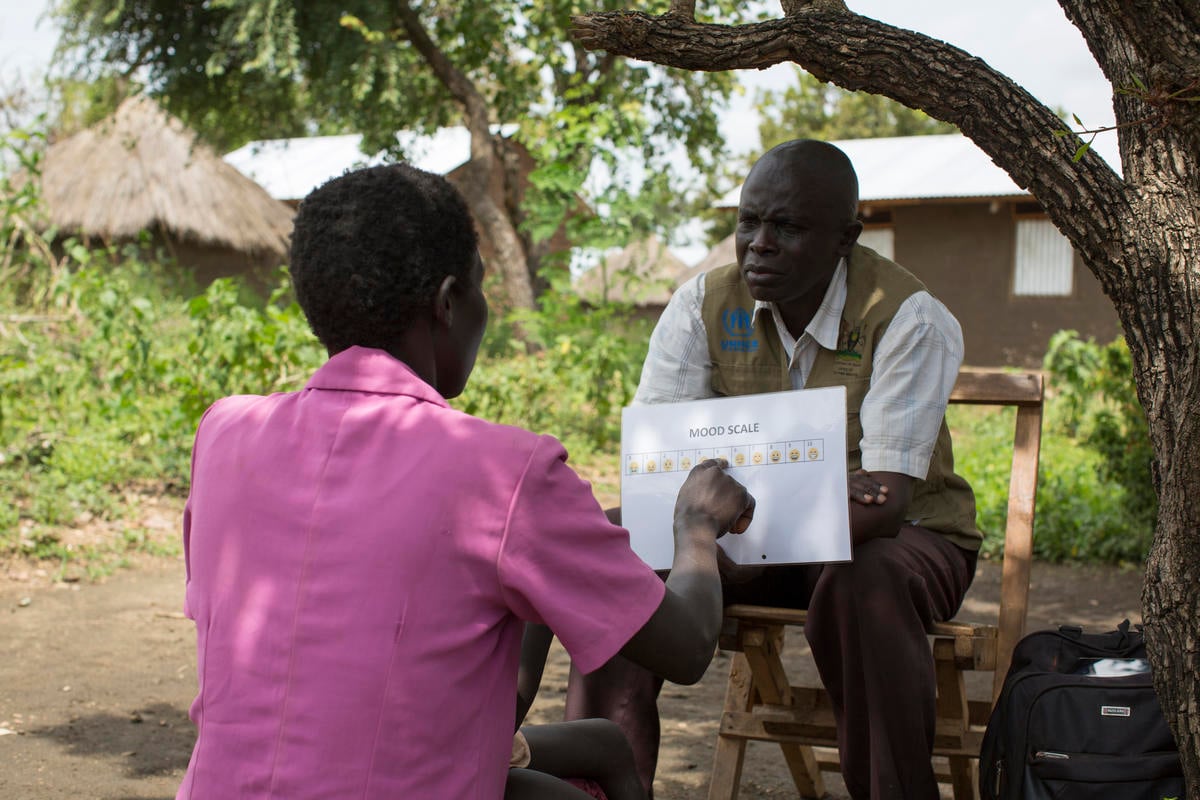Secretary-General applauds UNHCR's commitment to the world's internally displaced
Secretary-General applauds UNHCR's commitment to the world's internally displaced

GENEVA, October 6 (UNHCR) - UN Secretary-General Kofi Annan on Thursday hailed UNHCR's commitment to strengthen its involvement in the protection of the world's millions of internally displaced people, calling it a "landmark" step in UN efforts to better address the enormous needs of those uprooted within the borders of their own countries.
Addressing the annual meeting of UNHCR's 68-nation governing body, the Executive Committee, Annan said the provision of a more predictable and effective response for some of the world's most vulnerable people remains an outstanding humanitarian challenge.
"If this involves a new distribution of tasks, creating new partnerships and adjusting institutional arrangements, we shall do so," he told a packed conference hall in the UN's European headquarters. "The internally displaced must not be seen as an optional extra."
In all, there are an estimated 20-25 million internally displaced people worldwide who - unlike refugees who have crossed international borders and are protected by an international Convention - receive little or no help from the outside.
On Monday, Annan's UN Emergency Relief Coordinator, Jan Egeland, and High Commissioner for Refugees António Guterres outlined what they described as a "barrier-breaking proposal" that would allow for a more effective, cost-efficient and predictable response under a strengthened collaborative approach. The proposed approach includes assigning clearer responsibility and accountability to individual UN humanitarian agencies that have specific experience in certain sectors. UNHCR, for example, would lead a "cluster" of agencies in the provision of protection, camp management and coordination, and emergency shelter.
UNHCR has a mandate to care for the world's refugees - people fleeing persecution and conflict who have crossed international borders. While it has been involved in more than 30 operations over the past two decades to help internally displaced people, it has had to do so selectively in what Guterres described as a "pick-and-choose" basis. The High Commissioner has pledged that UNHCR will now be a more fully engaged partner in the joint UN humanitarian effort for the internally displaced.
"I applaud the commitment made by UNHCR to strengthen its efforts to protect internally displaced persons, and to take a lead role in assuring emergency shelter and coordination in the camps," Annan said. "This commitment is a landmark in our efforts to meet the General Assembly's regular demands to improve the predictability of our response in an area where it has been lacking. Moreover, UNHCR will make this contribution without any distraction from its responsibilities for cross-border refugees. I urge the Executive Committee to recognize UNHCR's efforts to reform the humanitarian response system, and to support the agency as it explores the financial and capacity implications of these efforts."
Some observers have questioned whether UNHCR's involvement with internally displaced people (IDPs) could detract from its mandated role of protecting the world's refugees and others of concern - a global caseload currently numbering more than 19 million people.
"Let me assure you that the decision was not taken lightly," the Secretary-General told 'ExCom' members Thursday. "We are conscious that UNHCR does have quite a lot on its plate, but what is important is that the IDPs also have needs and in the past we have tended to sort of wait until the crisis developed and appoint a lead agency - whether it is UNICEF, WFP or UNHCR. The decision here is to become more systematic and let UNHCR take the lead on the understanding that we will give UNHCR all the support that it needs. And, I hope the governments would also give their support.... "
The Secretary-General said the international community can no longer ignore the plight of internally displaced people. Failing to help governments address internal displacement at an early stage can bring bigger problems later, including refugee outflows to neighbouring countries which can be extremely difficult and destabilising.
"So, we are looking at it in that context," Annan said. "But let me assure you that we are conscious that we should not overload UNHCR, and I'm sure if that were to happen, [High Commissioner Guterres] will be the first to raise his hand to say, wait a moment, we need to look at this again."
On Monday, Guterres cited the conditions for UNHCR's involvement.
"There are two clear conditions to allow UNHCR's involvement with internally displaced persons at the request of the Humanitarian Coordinator, with the consent of the country itself: that we preserve the right of affected populations to seek and enjoy asylum, and the additionality of funding. Recognizing our role in mobilizing resources for internally displaced persons, we cannot divert funding intended for our work with refugees," he said.
Along with other partners, UNHCR would have access to a strengthened Central Emergency Revolving Fund for humanitarian emergencies which has already received pledges in excess of $150 million. The fund would ensure the UN agencies have guaranteed funds within three or four days of an emergency, thus ensuring a quick response when crises strike.








